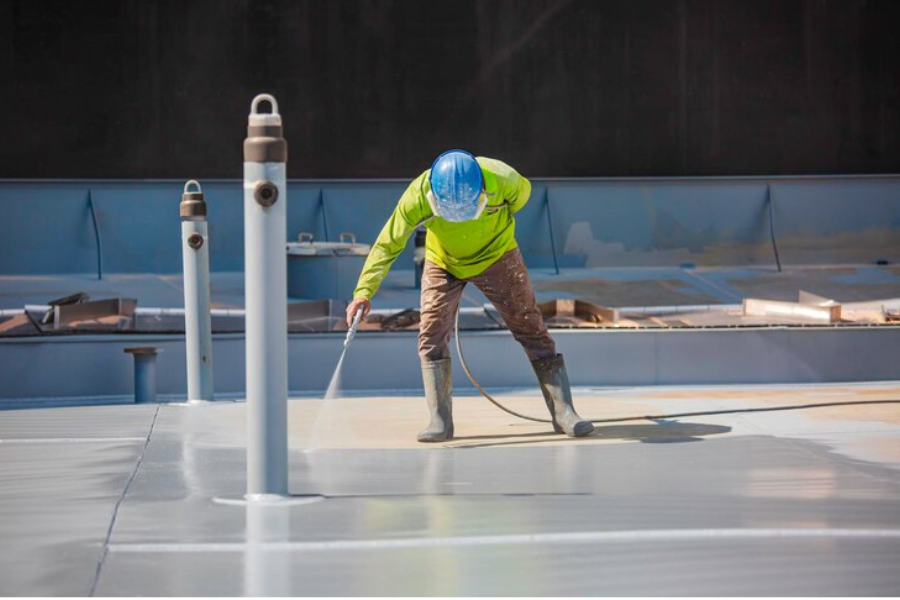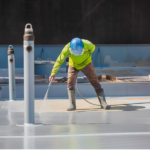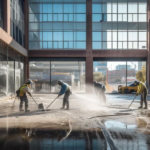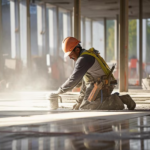Choosing the right commercial coating for various surfaces can be a challenging task, but it is crucial for the longevity and aesthetics of your facility. At Savage Surfaces, we understand the importance of selecting the appropriate commercial coating to ensure durability, protection, and visual appeal. In this comprehensive guide, we’ll walk you through the steps to select the best commercial coating for different surfaces, tailored to your specific needs.
Understanding Commercial Coating:
Commercial coating refers to a variety of products applied to surfaces to protect them from damage, enhance their appearance, and extend their lifespan. These coatings can be used on floors, walls, roofs, and other surfaces in commercial and industrial settings. Common types of commercial coatings include epoxy, polyurethane, acrylic, and elastomeric coatings.
Assessing Surface Types and Conditions:
Before choosing a commercial coating, it’s essential to evaluate the type of surface and its current condition. Different surfaces require specific coatings to achieve the best results. Evaluating the surface helps in identifying any necessary preparation work, such as cleaning, repairing cracks, or removing old coatings, to ensure the new coating adheres properly and performs well.
1. Concrete Surfaces:
Concrete is a popular material in commercial settings due to its durability and versatility. However, it requires protection from wear, chemicals, and moisture to maintain its integrity and appearance.
1.Epoxy Coatings: Epoxy coatings are ideal for high-traffic areas, providing a hard, durable finish that can withstand heavy loads and frequent use.
2. Polyurethane Coatings: These coatings offer excellent chemical resistance and flexibility, making them a great choice for areas where there is potential for chemical spills or where the floor may expand and contract due to temperature changes.
3. Acrylic Coatings: Acrylic coatings are best for areas where aesthetics are important, as they provide a glossy finish that enhances the appearance of the concrete.
2. Metal Surfaces:
Metal surfaces are prone to corrosion and rust, making it essential to choose the right commercial coating to protect them from environmental damage.
1.Zinc-Rich Primers: Zinc-rich primers provide excellent corrosion resistance by acting as a sacrificial layer, protecting the underlying metal from rust. They are commonly used on structural steel and other metal surfaces exposed to harsh conditions.
2. Epoxy Coatings: Known for their durability and protection against chemicals, epoxy coatings are a good choice for metal surfaces in industrial settings. They create a strong barrier that prevents moisture and chemicals from reaching the metal.
3. Polyurethane Coatings: Offering UV resistance and flexibility, polyurethane coatings are ideal for outdoor metal surfaces that are exposed to sunlight and weathering. They help maintain the appearance and structural integrity of the meta
3. Wooden Surfaces:
Wooden surfaces require coatings that protect against moisture, UV rays, and wear to prevent decay and maintain their appearance.
1. Polyurethane Coatings: These coatings provide a durable and glossy finish that enhances the natural beauty of wood while offering excellent protection against scratches, moisture, and UV rays.
2. Acrylic Coatings: Acrylic coatings offer UV resistance and are easy to apply, making them suitable for both interior and exterior wood surfaces. They are available in a variety of finishes, from matte to high gloss.
3. Elastomeric Coatings: Ideal for exterior wood surfaces, elastomeric coatings provide flexibility and excellent weather resistance. They can expand and contract with the wood, preventing cracking and peeling.
4. Evaluating Environmental Factors:
Environmental factors play a significant role in determining the right commercial coating. Consider the following when making your selection:
1.Temperature Fluctuations: Some coatings perform better in extreme temperatures. For example, epoxy coatings are durable in both high and low temperatures, making them suitable for environments with significant temperature changes.
2. Moisture Levels: Areas with high humidity or exposure to water require moisture-resistant coatings to prevent damage. Polyurethane and elastomeric coatings are particularly effective in such environments due to their water-resistant properties.
3. Chemical Exposure: Facilities that handle chemicals need coatings with high chemical resistance to prevent degradation and ensure safety. Epoxy and polyurethane coatings are commonly used in these settings for their robust chemical resistance.
4. UV Exposure: Outdoor surfaces need UV-resistant coatings to prevent fading and degradation caused by prolonged exposure to sunlight. Polyurethane and acrylic coatings are ideal for protecting surfaces from UV damage.
Also Read :10 Reasons Your Business Should Invest in Commercial Coating
Application Methods:
The application method is another critical factor in selecting the right commercial coating. Different coatings require specific application techniques for optimal performance. Understanding the pros and cons of each method can help you choose the best approach for your project.
1.Brush and Roller Application:
Pros: Brush and roller application is suitable for small areas and detailed work, allowing for precise control over the coating process. It is also relatively simple and inexpensive, making it accessible for many projects.
Cons: This method can be time-consuming for large surfaces, leading to inconsistent coverage and potentially higher labor costs. It is also challenging to achieve a smooth, even finish over extensive areas.
2.Spray Application:
Pros: Spray application provides even coverage and is efficient for large areas, reducing application time and labor costs. It is ideal for achieving a smooth, uniform finish and can reach areas that are difficult to coat with a brush or roller.
Cons: Spray application requires specialized equipment and skills, which can increase the overall cost of the project. Proper ventilation and protective measures are also necessary to ensure safety and prevent overspray.
3.Trowel Application
Pros: Trowel application is ideal for thick coatings and textured finishes, allowing for a high degree of customization and durability. It is often used for industrial floors and other heavy-duty applications where a robust, wear-resistant surface is required.
Cons: This method is labor-intensive and requires expertise to achieve the desired finish. It can also be more expensive due to the additional labor and time involved.
Benefits of Professional Application:
While some may consider DIY application, hiring professionals like Savage Surfaces ensures the best results. Our expert team has the experience and equipment to apply commercial coatings efficiently and effectively, ensuring long-lasting protection and aesthetic appeal.
Also Read : Unlocking the Benefits of Commercial Coating: A Step-by-Step Approach
Advantages of Professional Application:
Quality Assurance: Professionals ensure even coverage and adherence to specifications, reducing the risk of application errors and ensuring the coating performs as intended.
Time Efficiency: Faster application with minimal disruption to your business, allowing you to resume normal operations sooner.
Long-Lasting Results: Proper application extends the lifespan of the coating, providing better value for your investment.
Choosing the Right Commercial Coating: A Step-by-Step Guide:
To select the right commercial coating for different surfaces, follow a Step-by-Step Guide to the Commercial Coating Process.
1.Identify the Surface Type: Determine if the surface is concrete, metal, wood, or another material. This helps narrow down the types of coatings suitable for your project.
2. Assess Surface Condition: Check for cracks, corrosion, or other damage that needs repair before coating. Preparing the surface properly is essential for the coating to adhere correctly and perform well.
3. Consider Environmental Factors: Evaluate the environment where the coating will be applied, including temperature, moisture, and chemical exposure. This ensures the coating will withstand the conditions it will be exposed to.
4. Select the Coating Type: Choose a coating that matches the surface type and environmental conditions. Consider the properties and benefits of different coatings to make an informed decision.
5. Decide on Application Method: Determine the best application method for your project. Consider factors such as the size of the area, the desired finish, and available resources.
6. Hire Professionals: Engage a professional coating service like Savage Surfaces for optimal results. Our team ensures the coating is applied correctly and efficiently, providing long-lasting protection and aesthetic appeal.
Conclusion:
Selecting the right commercial coating for different surfaces is essential to protect your facility and enhance its appearance. By understanding surface types, environmental factors, and application methods, you can make an informed decision. Trust Savage Surfaces to provide high-quality commercial coating solutions tailored to your specific requirements. Contact us today to learn more about our services and how we can help you achieve the best results for your business.
For expert advice and professional commercial coating services, contact Savage Surfaces. Our team is ready to help you choose and apply the perfect coating for your needs. Contact us today on (440) 538-1119 or email us info@savagesurfaces.net.






